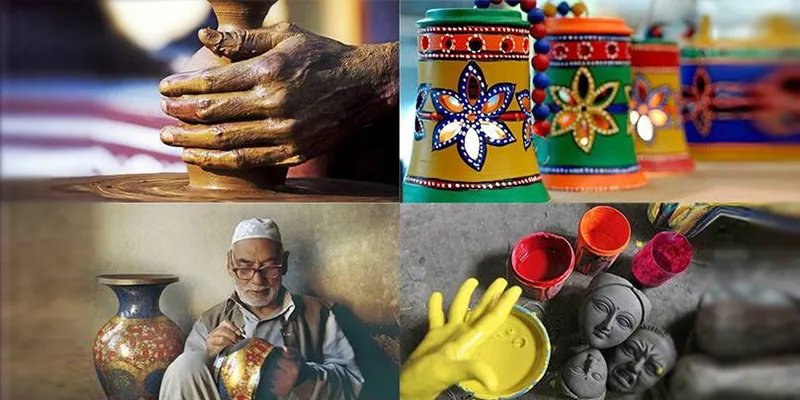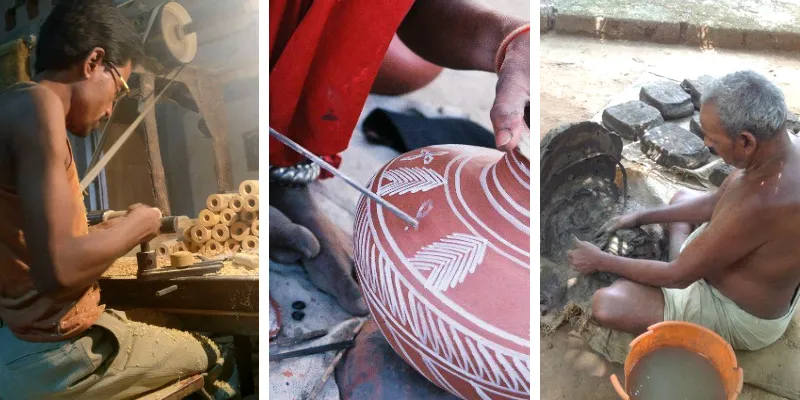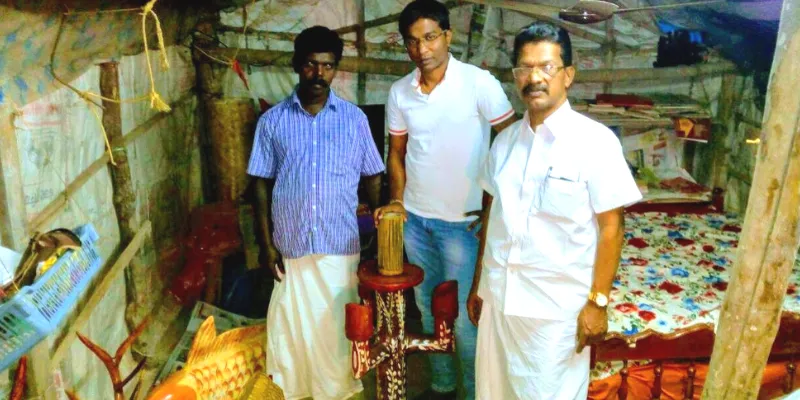How this online handicrafts marketplace is eliminating middlemen to ensure artisans get most of the proceeds from sales
Uthhan hosts over 15,000 products created by over 3,000 tribal artisans on their platform, and is helping generate regular income for 1,000 artisans.

Leemon Ravi
At the border of Karnataka and Kerala lies the Munnad village, in Kasaragod district, where handicrafts fashioned out of coconut shells where once a source of livelihood to the villagers. Today, this craft is practised by very few skilled artisans. Biju’s family is one of them.
“The tools used to make products out of coconut shells are simple and easy to use. They have good durability too,” Biju explains in sign language.
Although he is hearing and speech impaired, Biju refuses to bow down to his physical limitations, and says that the passion for the craft motivates him to continue working. With much enthusiasm, he and his family show us the multiple models of pen stands, cutlery, kettle, and showpieces made using coconut shells. However, the low demand for these handicrafts, and financial constraints pushed Biju to take up work as a daily-wage labourer.

Biju and his family display the crafts made out of coconut shells
Biju is not alone in his struggle. In fact, although India is home to seven million artisans, and is the second largest employer in developing nations, after agriculture, the country presently stands at a meagre two percent percent while China stands at 30 percent in the global handmade industry.
The Handicrafts Board of India in an assessment stated that since it is an unorganised sector, artisans face challenges such as low capital, poor exposure to new technologies, absence of market intelligence, and, most importantly, poor institutional framework.
The dire conditions in which artisans lived in his home state, Kerala, moved mechanical engineer Leemon Ravi to develop Uthhan, an online ecommerce platform that allows tribal artisans to market and sell their products. But the icing on the cake is that the 95 percent of the proceeds from the sale go directly to artisans, with no middleman eating into the amount.
Leemon tells YourStory,
“When I was in Wayanad for a personal visit, I met multiple tribal artisan families, and was shocked to see the poverty there. They have talent but their business is deteriorating because they do not have a market to showcase their products. They have no clue about online branding, and the benefits from the sale of their crafts were being reaped by the middlemen.”

Founded in 2012, today the platform hosts over 15,000 products created by more than 3,000 tribal artisans on their platform and is helping generate regular income to 1,000 artisans.
Also read: This former IBM employee is on a mission to revive Madhubani art and empower rural artisans
Tech for good
After completing his BE in Mechanical Engineering from LBS college of Engineering, Kerala, Leemon (36) worked in multiple organisations for seven years before starting his own Bengaluru-based bootstrapped startup, Golden Era Royal Group, a property development consultancy firm, in 2011. In 2012, when he decided to diversify into multiple segments, including software development and financial solutions, his team created an online ecommerce platform. Leemon realised that their product was offering the same services as the hundreds of other online shops.
“I wanted to do something that could benefit the larger masses, and wanted my products to create a sustainable impact,” he recalls.
Around that time Leemon read a news article about the problems faced by traditional artisans, and this got him thinking. After brainstorming for over six months with community leaders, software engineers, and artisan families, Uthhan was born with an aim to encourage the younger generation of the artisan community to continue their families’ generational craft form while providing them a platform for financial security, and dignity of labour.
Leemon says,
“The major challenge was to create awareness about Uthhan among artisans. It was a herculean task to make them understand the process, since it was online. Many of the families were unaware of operating online, and we had to train them. We slogged for almost 1.5 years to gain the trust from the initial batch of artisans."
Also read: SouvNear supports 10,000 Indian artisans by selling their products in 14 countries
The platform
With volunteers spread across Kochi, Thiruvananthapuram, Chennai, Hyderabad, Ranchi, and Bhubaneshwar, and by connecting multiple NGOs, Leemon’s nine-membered team identifies the artisan family and enrols them on the Uthhan platform. A unique ‘Artisan Identification Number’ (AID) is generated, and assigned to each family to ensure the authenticity of the products and help the consumer trace the origins of the handicraft.

Few of the artisans who are associated with Uthhan
The artisans can upload details about their products and even decide the price of the same. Once an order is received, the logistics team collects the product directly from the artisan’s house, and couriers it to the customer’s address.
Leemon explains,
“Once the families are enrolled we help them to create handicraft designs that are popular in the market. Since it's an online marketplace we are pushing artisan families to give emphasis on variety rather than quantity. Handicraft products are high on demand and all that is required is the right branding and packaging.
Terracotta products, and handmade jewellery sell like hotcakes on the platform, he adds.
Uthhan is also available in a multilingual - English, Hindi, Kannada, Malayalam, Tamil, and Telugu - mobile application.
Also read: These e-commerce platforms empower rural artisans by helping them earn better
Sustainable growth

At an artisan's house
Uthhan’s revenue model depends on corporate gifting and bulk orders. Ninety-five percent of the profit from sales goes directly to the artisan families, while five percent is utilised for Uthhan’s operations.
“Uthhan products are relatively cheaper since there are no middlemen involved. So the customers purchasing artisan products also will be benefitted,” Leemon adds.
They are also tying up with the Government of Chhattisgarh to boost sales, and provide further support to the artisan families. Leemon hopes to create housing, education, and insurance benefits for artisan families through Uthhan in the near future.
How Haryana transformed dismal student learning outcomes in its government schools
How online dating apps are making it easier for people with disabilities to look for love










